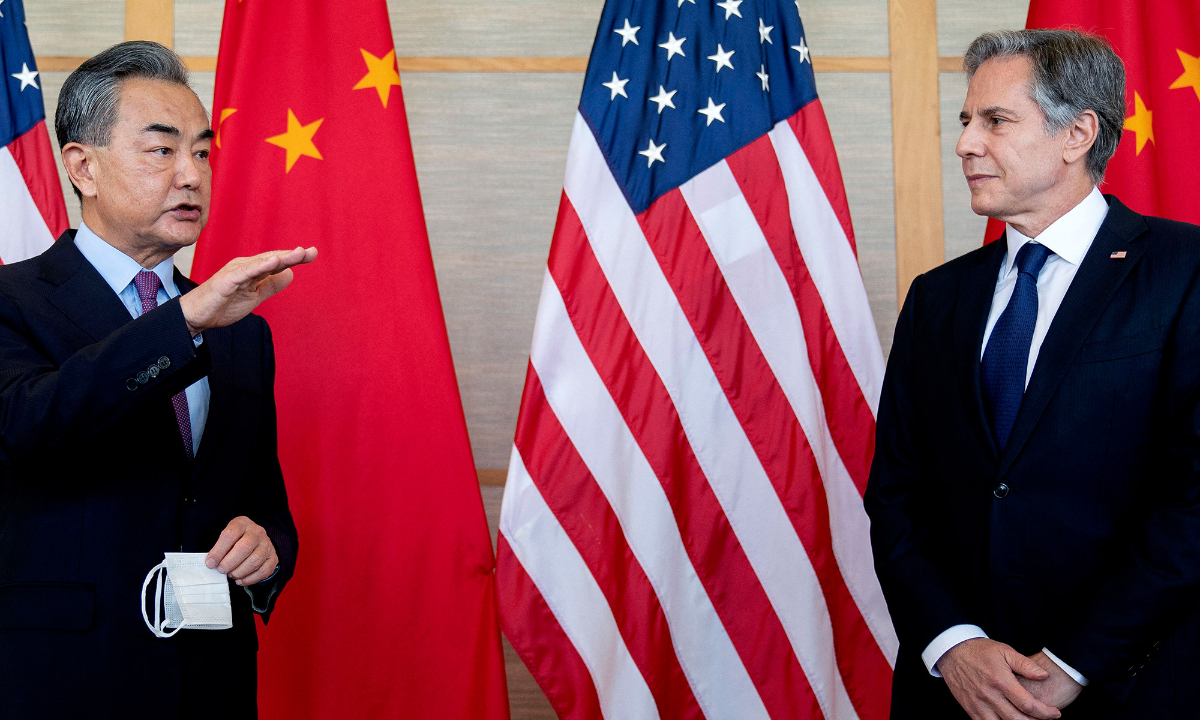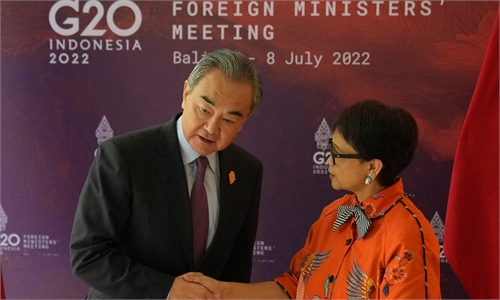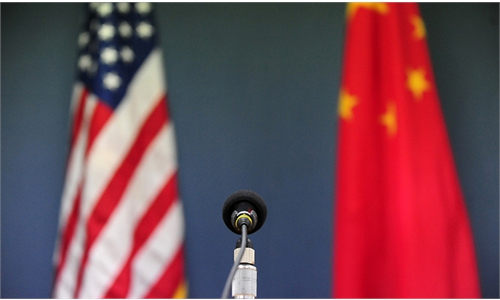Wang-Blinken ‘constructive’ meeting in Bali reduces misunderstanding; China makes stance clear by raising four lists

Photo: AFP
Chinese State Councilor and Foreign Minister Wang Yi had a five-hour long meeting with US Secretary of State Antony Blinken in Bali on Saturday, during which Wang pointed out the China-US three joint communiques are the real "guardrails" for bilateral relations. Wang also raised four lists for the US, including US' wrongdoings to be corrected, cases of concern to China, China-related bills of concern, and areas of potential cooperation.
Analysts noted that Wang and Blinken's meeting, the latest in a number of recent frequent high-level interactions between China and the US, may help create a good atmosphere for a future meeting between top leaders.
The Saturday meeting between Wang and Blinken was held on the sidelines of the G20 Foreign Ministers' Meeting and the two sides agreed the meeting was constructive and will help build mutual understanding, reduce miscalculation and create conditions for future exchanges between the two top leaders, according to a release from the Xinhua News Agency.
Wang-Blinken meeting this time was another high-level meeting aimed at implementing the consensus reached by the two heads of state in March this year. It is also an important step for China and the US to maintain communication, reduce misunderstanding, manage differences, and pave the way for future interactions between the top leaders, Diao Daming, an associate professor at the Renmin University of China in Beijing, told the Global Times on Saturday.
US President Joe Biden was cited by media in June as saying that he planned to talk with President Xi Jinping, while no information has been released by the Chinese side.
Diao said he noticed that before the talk started on Saturday, Blinken told media that he hoped this round of dialogue would be "productive." This detail was rare in the photo-taking section.
"I believe Blinken was trying to deliver a message that the US would like this meeting to achieve positive progress, and ease the bilateral relations. This shows the US's willingness for communication with China is increasing," said Diao.
During the meeting, Wang pointed out that the US has suffered serious Sinophobia and if it lets the situation goes on unchecked, the US' China policies will be at a dead end. He also noted the US' failure to honor its previous commitments in many fields.
Wang stressed that the best way to help China-US relations emerge from their current plight is to implement the consensus reached by the two heads of state and that the US should concretely fulfill US President Joe Biden's promises, including a commitment that US does not seek a new Cold War with China; it does not aim to change China's system; the revitalization of its alliances is not targeted at China; it does not support "Taiwan independence," and it has no intention to seek a conflict with China.
Biden made the above commitments in a virtual meeting with President Xi in November 2021, and during a subsequent video meeting in March, the US president reiterated these commitments.
Compared with the readouts released after previous meetings between senior officials, including recent dialogue between US national security advisor Jake Sullivan and China's top diplomat Yang Jiechi, Wang's remarks and warning to the US were notably more detailed and were "the sternest one in wording," Lü Xiang, a research fellow at the Chinese Academy of Social Sciences in Beijing, told the Global Times.
Phrases like "dead end" means the two sides are close to a showdown. "Either the strained China-US relations will alleviate, or the two sides face huge risks," Lü said.
However, given China's characterization of the meeting as "constructive," the US may have also provided some positive indications during the talks, the expert noted.
As reported by foreign media, Wang and Blinken's meeting lasted longer than five hours, a long time for a one-to-one meeting, and Wang and Blinken may have direct discussions addressing a number of topics without via translators, which means the effective time for the meeting was above three hours, which is rare and means the two sides had very candid talks and sent clear messages to each other, Lü said.
Among previous high-level meetings of senior officials from China and the US, the one held in Anchorage of Alaska in March 2021 between Blinken, National Security Adviser Jake Sullivan, and Yang Jiechi, a member of the Political Bureau of the CPC Central Committee and director of the Office of the Foreign Affairs Commission of the CPC Central Committee and Wang Yi, the two sides held three consecutive meetings, each of which lasted about three hours. In July 2021, Wang and Vice Foreign Minister Xie Feng met with US Deputy Secretary of State Wendy Sherman in Tianjin for six hours.

China US Photo:VCG
Setting guardrails
During the Saturday meeting, Wang told Blinken that as the US had promised not to support "Taiwan independence," it should stop hollowing out the one-China police or playing the "Taiwan card" to sabotage China's reunification.
Wang said the US has cited a need for 'guardrails" for China-US relations, the three joint communiques are in fact the most reliable "guardrails" for the two countries and as long as the two countries fulfill their promises in the three communiques, the bilateral relationship will not deviate from the track. Otherwise, more guardrails won't work, Wang said.
Over recent years, the Biden administration has mentioned the need for "guardrails" for bilateral relations on several occasions, but failed to offer a clear explanation of what these "guardrails" are. This time, Wang offered a clear response on the issue of "guardrails", Lü noted.
"If the guardrails of the Three Joint Communiques are 'torn down' by the US, China-US relations will be faced with an abyss," Lü said, noting that China had made its position sound and clear, and in particularly flagged the high level of risk surrounding the Taiwan question.
Diao noted that the Washington-proposed "guardrails" are entirely self-serving, as it wants to keep the bottom line of China-US relations stable and free of high-intensity conflict, but at the same time it seeks to contain China's development and to "encircle" it with its allies by playing up the "China threat" theory. Such "guardrails" are obviously unacceptable to China.
The three joint communiqués have been the cornerstone for maintaining healthy China-US relations and the effective communication between two countries over the past decades, "which has been proved by history," and should continue to play this role into the future, one expert said.
On Saturday, Wang also presented the US with four lists - one list requiring the US to correct wrong China-focused policies and remarks and actions, one addressing China's key concerns on key cases, one on US bills related to China, and a further listing outlining areas of cooperation covering eight fields, expressing hope that the US takes these items seriously.
The latter two lists are new additions to the previous two items, which China put forward during Sherman's visit to Tianjin in July 2021.
The four lists highlighted China's consistent attitude to the US and its policies. They also emphasized the key idea of mutual respect, Xin Qiang, deputy director of the Center for American Studies at Fudan University, told the Global Times on Saturday.
The Biden administration says the US will compete, collaborate and confront China as needed, but for the past one year, there has little cooperation between the two sides. Cooperation mechanisms damaged during the Trump administration have only been restored to a small extent. China has taken the initiative to propose potential areas of cooperation during this meeting, reflecting its capability to take a lead in the bilateral relationship, Lü said.
China-US relations are complex - although there are many sharp disputes and destructive forces at play, more factors across wider fields tie the two countries together. The Saturday meeting is a good opportunity to bring relations back to a more normal track and whether this goal can be realized relies on the rationality and determination of US leadership, Lü noted.


